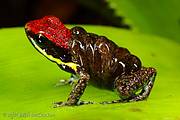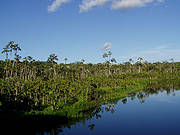Beyond oil fields to fields of dreams
08 September 2012 | Audio
In one of the biologically richest places on Earth which is also home to extensive oil fields, a new way of conserving forests is arising.
Asking the international community to financially support a dream might sound naïve but it is not. In the spirit of shared responsibility, Ecuador is seeking support for its Yasuni Ishipingo Tambococha Tiputini (ITT) Trust Fund established to protect an area which includes the Yasuni National Park. It was established by the Ecuadorian Government and the United Nations Development Programme (UNDP) in August 2010.
The Yasuni ITT Initiative tackles global warming by preventing the release of carbon reserves into the atmosphere. The area has an estimated 2,274 plant species and 655 species have been counted in just one hectare. There are also 593 recorded bird species, 150 amphibian and 121 reptile species.
Ecuador has committed to refrain from extracting the 846 million barrels of oil from the Yasuni National Park. So far, the Yasuni project has received the official support of various internationally recognized individuals, including: Nobel Prize winner Muhammad Yunus, Secretary General of the United Nations Ban Ki-Moon, HRH Prince Charles of Great Britain, Desmond Tutu, Jody Williams, Rigoberta Menchu, among others.
The initiative is based on a paradigm change towards a post-fossil fuel model of development with the aim of protecting biodiversity, assuring the sustainable livelihoods and culture of the indigenous communities living in voluntary isolation and to ensure net avoided greenhouse gas emissions.
Ivonne Baki, Chairman of the Yasuni ITT negotiating team explains what makes the Yasuni initiative a new kind of economic model:
The Trust Fund, which is governed by a Steering Committee comprised of representatives from the Government of Ecuador, contributing countries, civil society and UNDP, will channel contributions and ensure that funds are effectively and transparently used for sustainable development activities like preventing deforestation, reforestation, social development, scientific research, science and technology.





